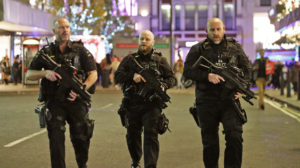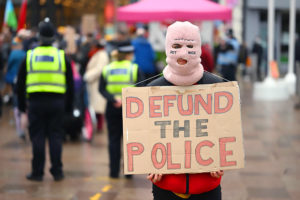Say what you like about Suella Braverman and her mixed reception among the general population, but she continues to enjoy the support of a key political, if not electoral, demographic: the Metropolitan Police. Following the shooting of Chris Kaba on Streatham Hill last September, and the charge of murder that is now hanging over the armed officer accused of firing a single round at the 24-year-old, the Home Secretary, unlike many of her predecessors, has accrued something of a fan club at the beleaguered Met. She is praised for championing both rank-and-file officers and their Commissioner, Sir Mark Rowley.
The rule of sub judice dictates that little can be said about the case against the defendant, whom we only know as NX121. But this hasn’t stopped Braverman from publicly stating that firearms officers have to make “split-second decisions” and must not fear “ending up in the dock for carrying out their duties” — words that one legal expert told me sound uncomfortably prejudicial.
Hot on the heels of her announcement, Rowley strategically published an open letter in which he “welcomed” Braverman’s support and argued for “the need to let the police police”. At best, open letters are like newspaper crosswords: coded for a particular audience but easily figured out by the average bus passenger. At worst, they can read like a career-suicide note, were circumstances change radically for the author. In this case, should NX121 go down for murder, Rowley’s reputation will take a dive with him. No Met commissioner wants that kind of publicity on their watch.
That said, it is too early to say what the effect of Braverman’s intervention, and Rowley’s tacit support for it, will be. For his part, Rowley’s hastily written gesture only came after more than 100 Specialist Firearms Command officers handed in their blue authorisation cards in protest. As for Braverman, it is unclear what the strategic review she has ordered will achieve.
Tony Long, a former police marksman, is sceptical that the proposed solutions are anything more than a sticking plaster. “The powers that be were talking about bringing the army in, but the only thing that squaddies can do under the circumstances is stand on doors with weapons that aren’t even loaded,” he says. “The aim is to take all the DPG [Diplomatic Protection Group] crews that have been standing on these doors, and redeploy them to do the job currently being done by ARVs [armed response vehicles].” The problem, he says, is that a DPG officer is only trained for four weeks, as opposed to the 14-week initial training course for ARV officers. “Once you’ve done your 14 weeks and been on the team for about a year, only then can you apply to do the CTFSO [Counter Terrorist Specialist Firearms Officer] course which is an additional 21 weeks.”
In the acronymic world of armed policing, where the Met’s specialist firearms unit SCO19 reigns supreme, taking out drug dealers, bank robbers or jihadists requires a skillset that your average embassy cop simply doesn’t have. As far as Braverman and Rowley are concerned, sending in unarmed soldiers or under-trained officers to protect the capital is once again about optics rather than operational capability.
By contrast, few understand the Met’s operational strengths and managerial weaknesses better than Long. A highly commended veteran of 33 years, 25 of which were spent in the force’s ever-evolving specialist firearms unit, he shot five suspects in the line of duty, killing three. He is also acutely aware of the politics surrounding NX121’s situation, having stood trial at the Old Bailey for murder in 2015 following the fatal shooting of Azelle Rodney — who, like Chris Kaba, was aged 24 and sat in a car when a police operation culminated in a “hard stop”.
Ultimately, Long was acquitted by a jury of his peers. Unlike NX121, however, he didn’t have the luxury of anonymity, something that Chris Kaba’s family, understandably, has questioned given the seriousness of the charge against him. One can only speculate as to why NX121’s continued anonymity was granted during his brief court appearance last week, but the secrecy only adds to a sense of distrust in a police force mired in scandals.
Perhaps sensing this weakness, Mayor of London Sadiq Khan has also jumped on the bandwagon, saying somewhat conspiratorially that “nothing is off the table” regarding the potential break-up of the Met. Khan knows all too well that 4,000 armed operations are carried out by the Met each year, resulting in just one or two fatalities. For a city of 8 million, that is a fairly low hit rate.
So why the call for drastic action? Like Braverman, who has failed to impress the electorate on immigration, and who is hoping to turn a human tragedy and an institutional crisis into political capital, Khan’s implied threat is a well-timed exploitation of a family’s grief, voter concerns, a police force’s weakness, and, as Tony Long points out, individual officers’ vulnerability.
“The officers who have downed tools are only taking this unprecedented stand because the suits haven’t had their backs,” he says. “Now that they’ve forced their hand, they’ve changed their tune.” Long is keen to stress that armed officers take on the role voluntarily, for no extra pay, and thus are not striking but using an agreed 10-day period of reflection — a policy designed to make sure that armed officers can get downtime if their “heads aren’t in the right place”.
“Senior management see firearms officers as expendable,” Long says, with more than a hint of personal animus. “They know they’re enthusiastic, keen and professional about the work, despite knowing that, if they shoot somebody, they’re going to get slaughtered in the press, charged with murder or suspended from work for up to five years. But management couldn’t care less. So, you know what? The lads don’t have faith in them, which is why the Met’s now in a bind.”
While Braverman and Rowley talk a good game about giving armed officers the “support” they need, and while Sadiq Khan cynically suggests that the Met may need to be carved out into various controllable fiefdoms, you can bet they are all working behind the scenes to “bring into line” what one insider describes as a “force within a force”. The wider issue, however, is how to muzzle a minority of armed police officers whose power lies in their high profile rather than their ballistic weaponry.
One way to do this would be to remove the voluntary aspect of armed policing and indeed create a genuine “force within a force”, with a completely different level of accountability that removes the potential for “reflection” to be used as de facto industrial action. Yet one serving firearms officer from another force, whose unit is considering downing tools in solidarity with SCO19, told me that he and his colleagues would balk at the idea of being “professionalised” in such fashion. He pilloried the idea that a separate, dedicated, national armed police force could ever become a reality, so potent is the notion that Britain “polices by consent” rather than political diktat.
Whatever the solution, the fact that we are having this debate at all — regardless of the political posturing at play — is remarkable. Striking doctors, like striking tube and train drivers, may be an inconvenience, but the rise of refusenik police officers smacks of a society-wide existential crisis. When the time comes for NX121 to account for his actions, it won’t just be him in the dock, it will be the Met’s management and the government’s leadership on trial, too.
Disclaimer
Some of the posts we share are controversial and we do not necessarily agree with them in the whole extend. Sometimes we agree with the content or part of it but we do not agree with the narration or language. Nevertheless we find them somehow interesting, valuable and/or informative or we share them, because we strongly believe in freedom of speech, free press and journalism. We strongly encourage you to have a critical approach to all the content, do your own research and analysis to build your own opinion.
We would be glad to have your feedback.
Source: UnHerd Read the original article here: https://unherd.com/



